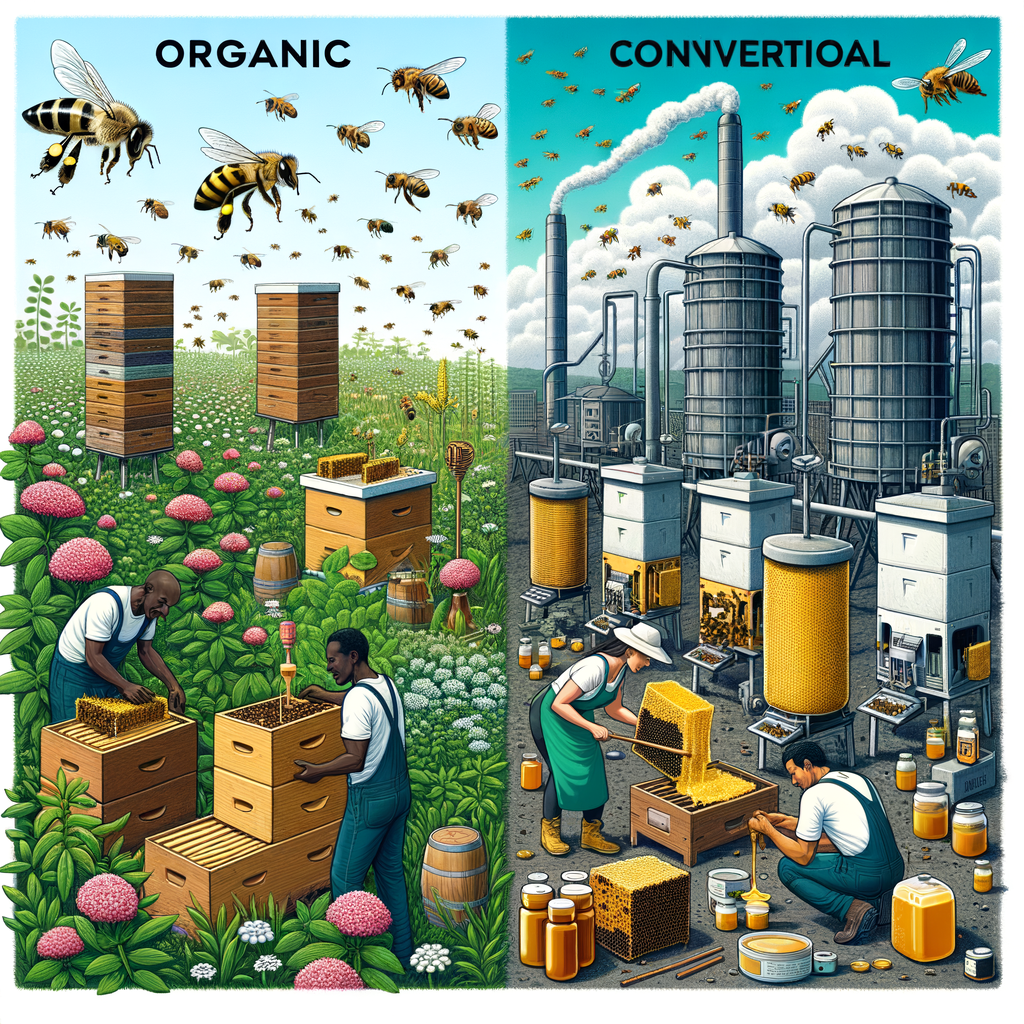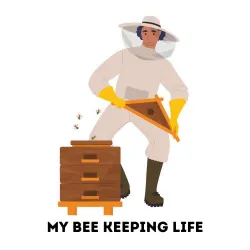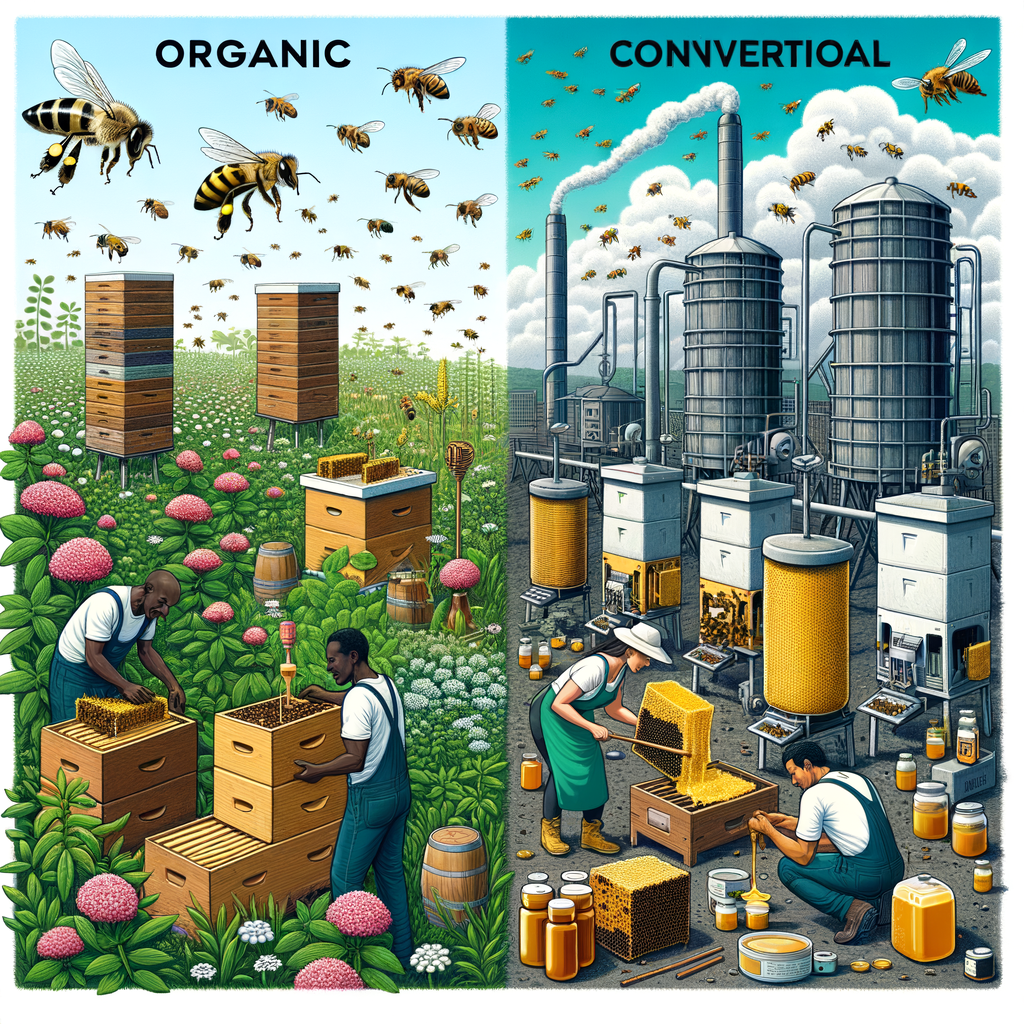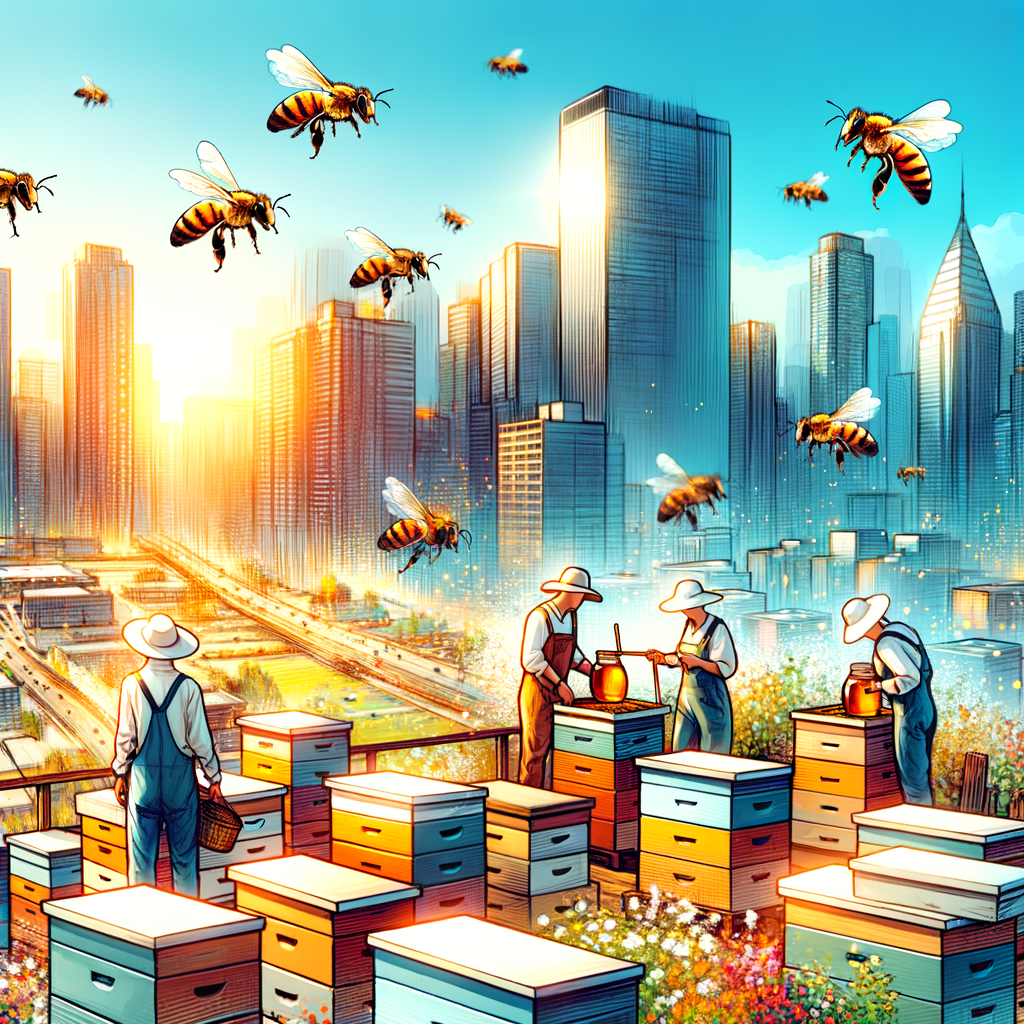
Introduction to Beekeeping Practices
Beekeeping, also known as apiculture, is an age-old practice that involves the maintenance of bee colonies in man-made hives. This practice is not just about honey production, but it also plays a crucial role in agriculture. Let’s delve into the fascinating world of beekeeping and its importance in agriculture.
-
- Overview of Beekeeping
Beekeeping is a practice that dates back to ancient times. It involves the upkeep of bees in hives to harvest honey and other products like beeswax, pollen, and royal jelly. Beekeepers, also known as apiarists, manage hives or colonies of bees in an area where there are flowering plants. These plants are the source of nectar, which bees convert into honey.
There are different types of bees used in beekeeping, but the most common is the European honey bee. Beekeepers often wear protective gear to prevent bee stings. The hives are designed to allow beekeepers to remove the honey without destroying the colony.
-
- Importance of Beekeeping in Agriculture
Beekeeping plays a vital role in agriculture through the process of pollination. Bees transfer pollen from the male parts of a flower to the female parts, allowing plants to grow seeds and fruit. This process is crucial for the growth of many crops.
According to the United Nations Food and Agriculture Organization, bees pollinate about 75% of the world’s food crops. Without bees, our food supply would decrease dramatically. Beekeeping helps to increase the number of bees, which in turn boosts crop production.
Beekeeping also contributes to biodiversity. Bees help to pollinate wild plants, promoting diversity in our ecosystems. Furthermore, beekeeping can provide a source of income for farmers and hobbyists alike.
Beekeeping is an essential practice that benefits not only the beekeepers but also our environment and food supply. As we delve deeper into this topic, we will explore different beekeeping practices, including organic and conventional methods, and their impacts on our world.
Organic Beekeeping
Definition and Principles of Organic Beekeeping
Organic beekeeping is a unique and eco-friendly approach to maintaining bee colonies. Unlike conventional methods, it emphasizes on natural processes and sustainability. Let’s delve deeper into its definition and key principles.
-
- What is organic beekeeping?
Organic beekeeping is a method of beekeeping that prioritizes the health and well-being of the bees. It involves using natural, chemical-free methods to manage bee colonies and produce honey. This method respects the natural behaviors and life cycles of bees, and avoids using synthetic chemicals or antibiotics that could harm the bees or the environment.
-
- Key principles of organic beekeeping
Organic beekeeping is guided by a few key principles that set it apart from conventional beekeeping. These principles include:
-
- Natural Living Conditions: Bees are kept in conditions that mimic their natural habitats as closely as possible.
- Chemical-Free Management: No synthetic chemicals or antibiotics are used in the management of the bee colonies.
- Sustainable Practices: Organic beekeepers prioritize sustainable practices that protect the environment and ensure the long-term health of the bee colonies.
- Respect for Bees: Organic beekeeping respects the natural behaviors and life cycles of bees, and avoids practices that cause them stress or harm.
In conclusion, organic beekeeping is a natural and sustainable approach to managing bee colonies. It respects the bees and their natural behaviors, and prioritizes their health and well-being above all else. By following these principles, organic beekeepers can produce high-quality, chemical-free honey while also contributing to the health of our environment.
Organic Honey Production Methods
Let’s dive into the fascinating world of organic honey production. This process is a bit different from conventional methods, but it’s all about keeping the bees happy and healthy. Here’s how it works:
- Steps in Organic Honey Production
Organic honey production involves several key steps:
- Choosing the Right Location: Beekeepers select a site that is free from pollutants and pesticides. The area must have a variety of organic flowering plants for the bees to feed on.
- Organic Beekeeping Practices: Beekeepers follow organic practices, such as avoiding synthetic chemicals and using natural methods to control pests and diseases.
- Honey Extraction: The honey is extracted using gentle methods that do not harm the bees or the hive.
- Quality Assurance: The honey is tested to ensure it meets organic standards. This includes checking for pesticide residues and other contaminants.
- Benefits of Organic Honey
Organic honey isn’t just good for the bees – it’s good for us too! Here are some of the benefits:
- Nutrient-Rich: Organic honey contains more nutrients than conventional honey. This includes vitamins, minerals, and antioxidants.
- Pure and Natural: Because organic honey is produced without synthetic chemicals, it is pure and natural. This means it’s free from harmful residues that can be found in non-organic honey.
- Better Taste: Many people believe that organic honey tastes better than conventional honey. This is because the bees have been feeding on a variety of organic flowering plants, which gives the honey a unique and rich flavor.
- Supports Sustainable Agriculture: By buying organic honey, you are supporting sustainable farming practices that are better for the environment.
Sustainable Beekeeping
As we delve deeper into the world of organic beekeeping, it’s important to highlight the role of sustainable practices and their impact on our environment. Sustainable beekeeping is a method that ensures the health and survival of bee colonies, while also promoting a balanced ecosystem.
-
- Role of Sustainable Practices in Organic Beekeeping
Sustainable practices in organic beekeeping are crucial for the health and longevity of bee colonies. These practices include providing bees with a natural and diverse diet, avoiding the use of synthetic pesticides, and ensuring the bees have a clean and safe habitat. This approach not only benefits the bees but also enhances the quality of the honey they produce.
For instance, by planting a variety of flowers and plants, beekeepers can provide bees with a diverse diet, which is essential for their health. Avoiding synthetic pesticides helps to protect bees from harmful chemicals that can weaken their immune system and make them more susceptible to diseases. Lastly, by maintaining a clean and safe habitat, beekeepers can prevent the spread of diseases and parasites that can harm the bee colonies.
-
- Impact of Sustainable Beekeeping on the Environment
Sustainable beekeeping has a positive impact on the environment. Bees play a vital role in pollination, which is essential for the growth of plants and crops. By maintaining healthy bee colonies, we can ensure the continuity of this vital process.
Moreover, sustainable beekeeping practices help to preserve biodiversity. By providing bees with a diverse diet, beekeepers contribute to the growth of various types of plants. This not only benefits the bees but also other wildlife that depend on these plants for food and habitat.
Finally, by avoiding synthetic pesticides, sustainable beekeeping contributes to a cleaner and healthier environment. These chemicals can contaminate soil and water, harming other wildlife and even humans. Therefore, sustainable beekeeping practices are not only beneficial for the bees but also for the overall health of our planet.
Conventional Beekeeping
Conventional beekeeping is a common practice that has been around for centuries. It is the traditional method of managing honeybee colonies to produce honey and other bee products. Let’s delve deeper into understanding this practice.
Understanding Conventional Beekeeping
In this section, we will explore what conventional beekeeping is and the common practices involved in it.
-
- What is conventional beekeeping?
Conventional beekeeping, also known as traditional beekeeping, is a method where beekeepers manage bees in a controlled environment. This method primarily focuses on maximizing honey production. Beekeepers provide bees with pre-made combs, often in a movable frame hive, and may use chemicals to control pests and diseases.
-
- Common practices in conventional beekeeping
Conventional beekeeping involves several practices that are designed to maximize honey production and maintain the health of the bee colony. These practices include:
-
- Feeding bees with sugar syrup: This is done to supplement the bees’ diet, especially during periods of nectar scarcity.
- Using chemicals: Conventional beekeepers often use chemicals to control pests and diseases that can harm the bee colony.
- Swarm prevention: Beekeepers use various techniques to prevent swarming (a natural process where a new bee colony is formed) as it can lead to a decrease in honey production.
- Requeening: This involves replacing the old queen bee with a new one to maintain the productivity of the hive.
Understanding these practices can help us appreciate the effort and dedication that goes into conventional beekeeping. It’s a practice that requires knowledge, skill, and a deep respect for nature.
Conventional Honey Harvesting
Let’s delve into the world of conventional honey harvesting, a practice that has been in existence for centuries. We’ll explore the process and also highlight the differences between organic and conventional honey harvesting.
-
Process of Conventional Honey Harvesting
The process of conventional honey harvesting starts with the beekeeper inspecting the hive. The beekeeper checks if the honeycombs are full and capped with wax by the bees. This wax capping is a clear indication that the honey is ripe and ready for harvesting.
Once the beekeeper confirms that the honey is ready, they use a smoker to calm the bees. The smoke makes the bees less aggressive, allowing the beekeeper to remove the honeycombs safely. The honeycombs are then placed in a machine called a honey extractor, which spins the honeycombs and forces the honey out through centrifugal force. The honey is then strained to remove any wax or bee parts, and finally, it’s ready to be bottled and sold.
-
Differences between Organic and Conventional Honey Harvesting
Conventional and organic honey harvesting processes are similar in many ways. However, the key difference lies in the treatment of the bees and the environment they live in. In conventional beekeeping, beekeepers may use synthetic chemicals to control pests and diseases in the hive. They may also feed the bees with sugar syrup during times of nectar scarcity.
On the other hand, organic beekeeping strictly prohibits the use of synthetic chemicals. Instead, organic beekeepers use natural methods to control pests and diseases. They also ensure that the bees forage in areas free from pesticides and other harmful chemicals. This means that organic honey is free from any chemical residues, making it a healthier choice for consumers.
While the conventional honey harvesting process is efficient and widely used, it’s important to understand the differences between it and organic honey harvesting. Making an informed choice can have a significant impact on the health of our bodies and the environment.
Organic vs Conventional Beekeeping
When it comes to beekeeping, there are two main methods that beekeepers use: organic and conventional. Both have their own unique practices, advantages, and disadvantages. Let’s dive into the differences between these two methods and see how they impact honey production.
Differences in Beekeeping Practices
-
- Comparing Organic and Conventional Beekeeping Practices
Organic beekeeping is a method that focuses on the natural behavior of bees. Organic beekeepers avoid using synthetic chemicals and antibiotics to treat their hives. Instead, they use natural methods like essential oils and organic acids. On the other hand, conventional beekeeping often involves the use of synthetic chemicals and antibiotics to manage pests and diseases. Conventional beekeepers may also use artificial feeding methods to boost honey production.
-
- Impact of These Practices on Honey Production
The practices used in organic and conventional beekeeping have a significant impact on honey production. Organic beekeeping practices tend to produce less honey compared to conventional methods. This is because organic beekeepers prioritize the health and natural behavior of the bees over maximizing honey production. On the other hand, conventional beekeeping methods often result in higher honey yields. However, the use of synthetic chemicals and antibiotics can affect the quality and taste of the honey.
Both organic and conventional beekeeping have their own unique practices and impacts on honey production. It’s up to each beekeeper to decide which method aligns best with their values and goals.
Natural Beekeeping Techniques
As we delve deeper into the world of beekeeping, it’s essential to explore the natural techniques that can be employed, particularly in organic beekeeping. These methods not only promote healthier bees but also contribute to a more sustainable environment. Let’s take a closer look at these techniques and how conventional beekeeping can adopt them.
-
- Exploring natural techniques in organic beekeeping
Organic beekeeping emphasizes the use of natural techniques to maintain and enhance the health of the bee colonies. These techniques include:
-
-
- Chemical-free beekeeping: This involves avoiding the use of synthetic chemicals or pesticides in the hive. Instead, natural substances like vinegar and essential oils are used to control pests and diseases.
- Providing natural food sources: Organic beekeepers often plant a variety of flowers and plants that bees naturally feed on, instead of using sugar water or other artificial feed.
- Respecting bee behavior: This means allowing bees to build their own comb structure, swarm naturally, and maintain their own queen, rather than manipulating these processes for higher honey production.
-
These practices not only ensure the health of the bees but also result in high-quality, chemical-free honey.
-
- How conventional beekeeping can adopt natural techniques
While conventional beekeeping often relies on synthetic chemicals and artificial feeding, it can benefit greatly from adopting natural techniques. Here’s how:
-
-
- Reducing chemical use: By using natural substances to control pests and diseases, conventional beekeepers can reduce their reliance on synthetic chemicals, which can harm bees and contaminate honey.
- Encouraging natural behavior: Allowing bees to behave naturally, such as swarming and building their own comb, can lead to healthier, more resilient colonies.
- Providing natural food sources: Planting a variety of flowers and plants can provide bees with a more nutritious diet than artificial feed, leading to healthier bees and better-quality honey.
-
Adopting these natural techniques can help conventional beekeepers transition towards more sustainable and ethical practices, benefiting both the bees and the environment.
Case Studies
Case Study: Successful Organic Beekeeping
Let’s dive into a real-life example of successful organic beekeeping. This case study will provide a clear picture of how organic beekeeping can be both profitable and sustainable.
-
- Overview of the case study: Our case study focuses on HoneyBee Organics, a small-scale beekeeping operation located in the heartland of America. With a strong commitment to organic practices, HoneyBee Organics has managed to build a thriving business while also promoting the health and wellbeing of their bees. They avoid the use of synthetic chemicals and antibiotics, instead relying on natural methods to maintain their hives. This includes using organic feed and implementing natural pest control methods.
- Key takeaways from the case study:
- Organic beekeeping can be profitable: Despite the challenges, HoneyBee Organics has found a profitable market niche selling their organic honey and other bee products.
- Sustainability is key: By focusing on sustainable practices, HoneyBee Organics has been able to maintain healthy hives and high-quality products.
- Consumer demand for organic products: The success of HoneyBee Organics highlights the growing consumer demand for organic, sustainably-produced products.
In conclusion, this case study demonstrates that organic beekeeping can be a successful and sustainable practice. It requires dedication, knowledge, and a commitment to natural methods, but the rewards can be significant, both in terms of profitability and the health of the bees.
Case Study: Conventional Beekeeping Challenges
- Introduction to the Case StudyOur case study focuses on a conventional beekeeper from the Midwest, who we’ll call Mr. Beekeeper. He has been in the beekeeping business for over 20 years, strictly adhering to traditional methods. His operation includes the use of synthetic pesticides to control pests and diseases, artificial feeding during lean seasons, and migratory beekeeping practices.
Despite his extensive experience and adherence to conventional beekeeping methods, Mr. Beekeeper has faced several challenges. These include declining bee populations, increased disease outbreaks, and reduced honey production.
- Lessons Learned from the Case StudyThe challenges faced by Mr. Beekeeper highlight the inherent problems with conventional beekeeping. The use of synthetic pesticides, while effective in the short term, has long-term effects on the health and vitality of the bee colonies. The artificial feeding practices, although necessary during lean seasons, do not provide the same nutritional value as natural forage, leading to weakened bee colonies.
Migratory beekeeping, a common practice in conventional beekeeping, has also been a source of stress for the bees, leading to increased susceptibility to diseases and pests. This practice also contributes to the spread of diseases and pests to different regions.
Conventional Beekeeping Practices Challenges Synthetic Pesticides Long-term effects on bee health and vitality Artificial Feeding Reduced nutritional value leading to weakened colonies Migratory Beekeeping Increased stress and disease spread In conclusion, this case study underscores the need for sustainable and organic beekeeping practices. These practices prioritize the health and well-being of the bees, leading to stronger colonies and increased honey production.
Conclusion
In this article, we have delved deep into the world of beekeeping, exploring both organic and conventional practices. Let’s summarize our findings and look towards the future of beekeeping.
-
- Summarizing the debate: Organic vs Conventional Beekeeping
Organic beekeeping emphasizes natural methods, prioritizing the health and well-being of the bees. It avoids synthetic chemicals and antibiotics, instead using natural remedies to prevent diseases. On the other hand, conventional beekeeping often employs chemical treatments to combat pests and diseases, and may use artificial feeding methods.
While organic beekeeping is seen as more sustainable and eco-friendly, it can be more labor-intensive and less predictable. Conventional beekeeping, though often more efficient and predictable, can contribute to environmental degradation and bee health issues.
Both methods have their pros and cons, and the choice often depends on the beekeeper’s goals, resources, and values.
-
- Future trends in beekeeping practices
Looking forward, we can expect to see a continued emphasis on sustainable and eco-friendly beekeeping practices. There is a growing trend towards organic methods, as more and more beekeepers become aware of the environmental and health benefits.
Technological advancements are also expected to play a significant role in the future of beekeeping. Innovations such as remote hive monitoring and automated honey extraction systems could make beekeeping more efficient and less labor-intensive.
Education and research will continue to be crucial in advancing beekeeping practices and ensuring the health and survival of our bee populations.
Whether you choose organic or conventional beekeeping, it’s clear that this practice plays a vital role in our ecosystem. By understanding and respecting the needs of the bees, we can ensure their survival and continue to enjoy the fruits of their labor.








